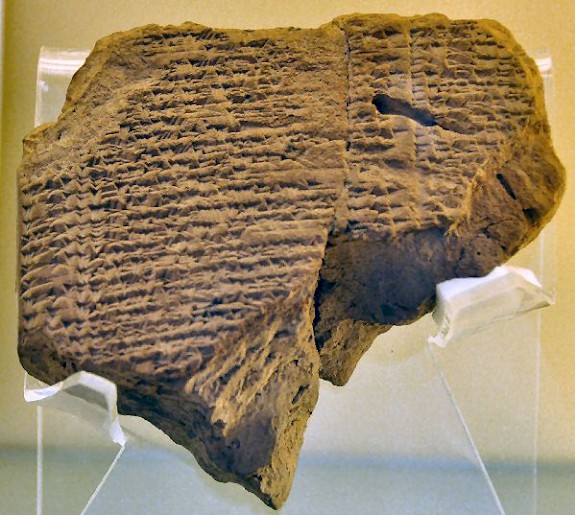Jehoiachin in Babylonia
One of the last kings of Judah, Jehoiachin (r.598-597) was taken captive by the Babylonians (2 Kings 24.15; ABC 5) and lived in exile in the country of the conquerors. However, he was released, and a couple of cuneiform tablets from Babylonia inform us about his fate.

The story of Jehoiachin's release can be found at the end of the Biblical book 2 Kings:
And in the thirty-seventh year of the exile of Jehoiachin king of Judah, in the twelfth month, on the twenty-seventh day of the month, Evil-merodach king of Babylon, in the year that he began to reign, graciously freed Jehoiachin king of Judah from prison; and he spoke kindly to him, and gave him a seat above the seats of the kings who were with him in Babylon. So Jehoiachin put off his prison garments. And every day of his life he dined regularly at the king's table; and for his allowance, a regular allowance was given him by the king, every day a portion, as long as he lived.note
There are several possible dating systems, but the accession year of Amel-Marduk (or Evil-merodach) was 562/561, and this is more or less identical to the thirty-seventh year of the exile of Jehoiachin, which began in 596 (ABC 5 with note); the twenty-seventh day of the thirty-seventh year must be somewhere in the spring of 560. There is a small error, but it is not disastrous. We can be sure that Jehoiachin was released when Amel-Marduk became king, after his father Nebuchadnezzar had died.
Why Amel-Marduk released the former king of Judah is not known, but a recent theory is that as a crown prince, the Babylonian had fallen victim to a court intrigue and had been sent to prison. There, he may have met Jehoiachin.
According to Talmudic traditions, Jehoiachin lived in Nehardea, not far from Sippar, in the north of Babylonia. In general terms, this is confirmed by about thirty-five cuneiform texts referring to a village called âl-Jahûda ("the Judaean town") near Sippar. The prophet Ezekhiel mentions a settlement called Tell Abib near Nippur.
There are several cuneiform texts that illustrate Jehoiachin's position after his release, which were discovered by Robert Koldewey in Babylon and are collectively known as ANET3 308.note These documents, now in Berlin, are lists of deliveries of food and oil to important people, and prove that the king of Judah (who is called Ia-'-u-kin, Ia-'-kin, and Ia-ku-ú-ki-nu) received substantial rations. Here are the relevant lines:
1
... to Ia-'-u-kin, king ...
to the qîpûtu-house of ...
... for Shalamiamu, the ...
... for 126 men from Tyre ...
... for Zabiruam the Ly[dian] ...
2
10 sila of oil to ... [Ia]-'-kin, king of Ia-[a-hu-du]
2½ sila of oil to the [five so]ns of the king of Ia-a-hu-du
4 sila to eight men from Ia-a-hu-da-a-a ...
3
1½ sila for three carpenters from Arvad, ½ sila each
11½ sila for eight ditto from Byblos, 1 sila each ...
3½ sila sila for seven ditto, ½ sila each
½ sila for Nabû-êtir the carpenter
10 sila to Ia-ku-ú-ki-nu, the son of the king of Ia-ku-du
2½ sila for the five sons of the king of Ia-ku-du through Qana'a
Comment
The third list is the most interesting, because it suggests that Jehoiachin had five sons, whereas the Bible says that there were seven::note
The sons of Jehoiachin, the captive: Shealtiel his son, Malchiram, Pedaiah, Shenazzar, Jekamiah, Hoshama, and Nedabiah.
Perhaps two had died, or had not yet come of age. It is also possible that a mistake was made by someone who copied this verse, because the wording is a bit odd and there is a variant reading. The text, as we now have it, suggests that only Shealtiel was Jehoiachin's son, and the other names are in fact without qualification. Perhaps they are descendants of Malchiram, son of Shealtiel, and perhaps we should read:
The sons of Jehoiachin, the captive: Shealtiel his son, Malchiram his son, and Pedaiah, Shenazzar, Jekamiah, Hoshama, Nedabiah, the sons of Malchiram.
Of course, this implies that the five sons of text three are in fact five descendants, which is certainly possible, because the word "son" was frequently used in a very loose sense. This creates another problem, however: why aren't Shealtiel and Malchiram mentioned in text three? Perhaps they had become courtiers of one of the Babylonian kings, but this is just a hypothesis.
A final remark: because Jehoiachin had been king for a mere three months, he could also be described as "the son of the king of Judah" in the third text.
Literature
- ANET = James K. Pritchard, Ancient Near Eastern Texts relating to the Old Testament (1969 third edition)
- Diana Edelman, The Origins of the 'Second' Temple. Persian Imperial Policy and the Rebuilding of Jerusalem (2005), pp.21-22
- Irving Finkel, "The Lament of Nabû-šuma-ukîn" in J. Renger (ed.), Babylon. Focus mesopotamischer Geschichte, Wiege früher Gelehrtsamkeit, Mythos in der Moderne (1999 Saaerbrücken) 323-341